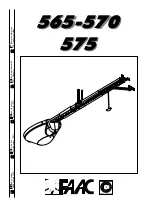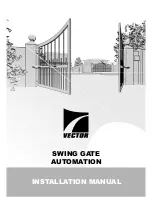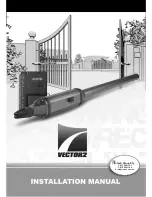
(3) 3/8” - 16 x 1-1/2”
hex head screws
(3) 3/8” - 16
Hex nuts
(3) 3/8”
Washers
(3) 3/8”
Washers
(3) 3/8” Lock
washers
Coupler halves
Set screws
Set screws
Facing the inside of the door, lay the (2) torsion keyed shafts on the floor. One torsion keyed
shaft on the left hand side and the other torsion keyed shaft on the right hand side. Starting
on the left hand side, lay one of the coupler halves, the center bearing, torsion spring with
the black winding cone and one set collar at the left end of the torsion keyed shaft. Next on
the right hand side, lay the other coupler half, center bearing, the torsion spring with the red
winding cone and one set collar at the right end of the torsion keyed shaft. Slide the coupler
halves, center bearings onto the torsion keyed shafts followed by the torsion springs and the
set collars, as shown.
IMPORTANT:
THE COUPLER HALVES, CENTER BEARINGS, TORSION SPRINGS AND THE SET
COLLARS MUST BE POSITIONED, AS SHOWN.
Slide the flat edge of the coupler half flush with the side edge of the torsion keyed shaft.
Insert (1) key into the slot of both the coupler half and the slot in the torsion keyed shaft.
Tighten the (2) set screws and the locking nut to secure the coupler half to the torsion keyed
shaft, as shown.
NOTE:
Tighten the set screws to 14-15 ft-lbs (Once set screws contact the shaft, tighten
screws an additional 1/2 turn).
Repeat the same process for the other coupler half.
Torsion
keyed
shaft
Center
bearing
Center
bearing
Coupler
halves
Coupler halves
assembled
Set screws
and Lock nut
Key
Key
Torsion keyed shaft
Left wound, black
winding cone (left
hand side)
Right wound, red
winding cone (right
hand side)
Set collar
Set collar
Torsion keyed shaft
Center
bearing
Center
bearing
Coupler
halves
Coupler halves
assembled
Set screws
and Lock nut
Key
Key
Torsion keyed shaft
Left wound, black
winding cone (left
hand side)
Right wound,
red winding cone
(right hand side)
Center bearing
Set
collar
Set
collar
With assistance and starting on the left hand side of door, pick up the left hand torsion spring
assembly and slide one end of the torsion keyed shaft through the end bearing bracket. Lay
the other side of the torsion keyed shaft into the center bracket. Repeat the same process
for the right hand torsion spring assembly. Position both torsion keyed shafts so that equal
amounts of the shafts extend from each end bearing brackets.
Torsion
keyed
shaft
Left wound, black winding
cone (left hand side)
Set collar
Center
bearing
Coupler
halve
Center bearing
brackets
Left hand end
bearing bracket
Equal
spacing
Right hand end
bearing bracket
Equal
spacing
Torsion
keyed
shaft
Set
collar
Equal spacing
Center
bracket
bushing
Center bracket
Torsion keyed shafts
Right hand end
bearing bracket
Left hand end
bearing bracket
Set collar
Set collar
Attaching Springs to Center Bracket
19
IMPORTANT:
THE SPRING WARNING TAG(S) SUPPLIED MUST BE SECURELY ATTACHED
TO THE STATIONARY SPRING CONE(S) IN PLAIN VIEW. SHOULD A REPLACEMENT SPRING
WARNING TAG BE REQUIRED, CONTACT WAYNE DALTON FOR FREE REPLACEMENTS.
NOTE:
Measure the diameter of your springs. If your spring diameter is 3-3/4”, the springs
do not share center brackets. If your spring diameter is either 2” or 2-5/8”, then two springs
will share the same center bracket, unless a coupler assembly is provided.
IF YOU DON’T HAVE A COUPLER ASSEMBLY: Slide center bracket bearing into the spring.
Align the stationary spring cone(s) with the holes in the center bracket bearing assembly. Se-
cure the torsion spring(s) to the center bracket bearing assembly with (2) 3/8” - 16 x 1-1/2”
hex head bolts and (2) 3/8” - 16 nuts.
IMPORTANT:
NEVER USE MORE THAN ONE BEARING WHEN ATTACHING TWO SPRINGS TO
ONE CENTER BRACKET.
Center
bracket
bearing
Stationary
spring
cone
Center
bracket
Torsion
spring
Stationary
spring cone
Torsion
spring
3/8”-16 x 1-1/2”
Hex head bolts
3/8”-16
Hex nuts
Spring
warning
tag(s)
Center
bracket
Center
bracket
bearing
IF YOU HAVE A COUPLER ASSEMBLY:
Slide center bracket bushing into the spring. Align
the stationary spring cone with the holes in the center bracket. Secure the torsion spring to
the center bracket with (2) 3/8” - 16 x 1-1/2” hex head bolts and (2) 3/8” - 16 nuts. Repeat
the same process for the other center bearing bracket. At the middle of the two center
bearing brackets, re-assemble the coupler assembly by loosely fastening the coupler halves
together using the (3) 3/8” - 16 x 1-3/4” hex head screws and the (3) 3/8” - 16 nylon hex
lock nuts, as shown.
NOTE:
Ensure both torsion keyed shafts have equal amounts of the shafts extending from
each end bearing bracket.
10
Summary of Contents for 8700
Page 17: ......




































